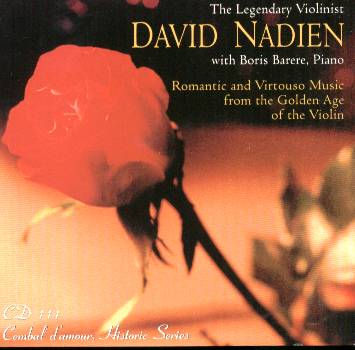I waxed lyrical when reviewing the second volume in
this David Nadien series (Cembal d’Amour CD117). I won’t rehearse the
biographical material here – except to note that his distinguished career
began with first prize in the Leventritt Award in 1946 and that many
years later he was to become leader of the New York Philharmonic under
Bernstein. His teachers were Adolph Betti of the Flonzaley Quartet and
Ivan Galamian who clearly gave him a formidable grounding because his
qualities – technical, tonal and expressive – mark him as a violinist
of consistently superior calibre. This disc of eighteen Old School favourites
is drawn from rare Kapp LPs and the performances show utter stylistic
affinity, gorgeous liquidity of tone, magnificent allure and a vibrato
both intensely fast and stunningly vibrant.
The disc starts with a Salut d’Amour that basks
in luxurious intensity, full of rubati, portamenti and dynamic variance.
There’s luscious depth here and real emotive intensity is reserved for
the final phrases - though it’s not an ideally sweet performance and
misses something of the piece’s innocence. The Paganini is thrown off
with marvellous control (even if very occasionally there is some dryness
in the passagework) but in the Massenet he fines his vibrato to a core
and embodies the chastity evoked with fidelity and elegance. Accompanist
Boris Barere – son of Simon, as I suppose he’s constantly called – shows
his mettle in the introduction to Sarasate’s Caprice Basque and
he plays with splendid rhythmic watchfulness. Nadien’s Iberian flair
is full of panache and his harmonics are in tune and relished with devilish
insouciance. A miniaturist sensitivity is unleashed on Drdla’s evergreen
Souvenir where his phrasal elasticity is allied to truly luscious
– maybe even lascivious – portamenti. He takes his time in Kreisler’s
Caprice Viennois, which is an unusually watchful performance,
though he mines the Rosenkavalieresque final scurry with puckish humour.
It’s true that sometimes Nadien’s remarkably intense vibrato can be
overpowering and this danger manifests itself in Raff’s Cavatina.
For my taste there is a little too much emotive intensification – the
line positively bristles with incident – and whilst the vibrato usage
and consequent colouration is intensely evocative it can be too much
of a good thing in a piece like this. The rubati and emotive finger
position changes are in the end counter-productive.
But it’s back to top form though in Zapateado.
This is vibrancy itself, with some lustrous playing, fizzing left hand
pizzicati and ear tickling theatricality. He laces Mendelssohn with
quick slides, intensified vibrato and a spirit of generous communion.
His Debussy is quite slow, patrician and elegant with some delicacy
and heavily vibrated phraseology. Perhaps he lacks the soaring, wounded
sensuality of Thibaud here and that extraordinary artist’s sense of
incipiently vested pain in this piece – but then everyone does. In Kroll’s
slice of Americana, Banjo and Fiddle, Nadien is idiomatic and
saucy and in Sarasate’s Habañera he is meaty but sensitive,
his passagework of coruscating precision with some gloriously actorly
rubati. Old World expressivity appears in Rubinstein’s Melody in
F – though he entirely abjures salon simplicities – because there
is a genuine and welcome seriousness to his playing with also some sensuous
left hand emotiveness; this is an unusually sophisticated performance
such as few of his contemporaries could manage – it combines stylistic
acumen and tonal beauty. Vieuxtemps’ Regrets is an unusual choice
but a fine one and reaches a stunning apex of magnificent control and
declamatory elation. He points Fauré’s Berceuse just a
little too hard and arguably there’s again rather too uncomfortable
a sense of over intensity but the Introduction and Tarantella of
Sarasate is a winner – lashings of temperament and colour. The ending
is a tour de force. Finally Kreisler’s Praeludium and Allegro which
opens in leonine fashion and features a rather slow Allegro; he keeps
up the tension through his shading and splendid diminuendos even though
there is maybe something slightly didactic about some of the passagework.
Quibbles, of course. As what one could call a leader-soloist
Nadien sits at the most elevated level. I look forward to seeing further
Nadien discs, preferably of the heavyweight concertos he performed over
the years and that may have been preserved in broadcast recordings.
Make no mistake – his name may mean little to you but he is a violinistic
titan and if you’ve had your fill of anaemic fiddlers then have a transfusion
of Nadien and luxuriate in the richness and succulent power of a remarkable
musician.
Jonathan Woolf

